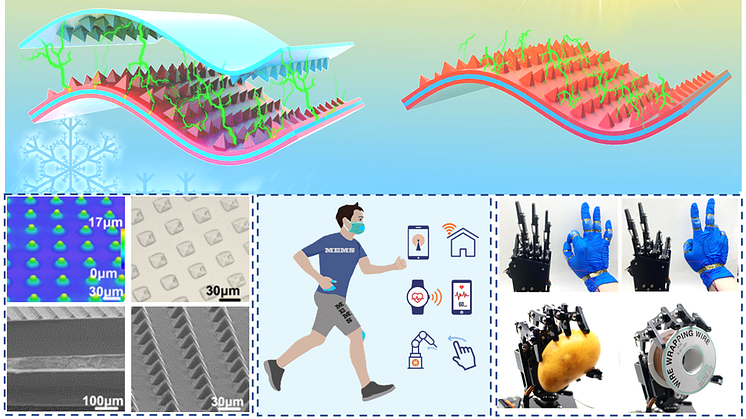
Press release -
New research harnesses the power of movement
Harvesting energy from the day-to-day movements of the human body and turning it into useful electrical energy, is the focus of a new piece of research involving a Northumbria University Professor.
Academics from Northwestern Polytechnical University in China, supported by Professor Richard Fu from Northumbria, have developed a unique design for sensors capable of using human movements - such as bending, twisting and stretching - to power wearable technology devices including smart watches and fitness trackers.
Self-powered pressure sensors are one of the key components used in these smart electronic devices which are growing in popularity today. The sensors can operate without the need for external power supplies.
Detecting health conditions and measuring performance in sport are among the potential uses for these types of sensors. As a result, they are the focus of extensive research and development, but remain challenging to produce with the performance sensing, flexibility, and sufficient level of power needed for wearable technology.
A new research paper published in the prestigious international scientific journal, Advanced Science, describes how the team led by Professor Weizheng Yuan, Professor Honglong Chang and Associate Professor Kai Tao from Northwestern Polytechnical University (NPU), has worked with Professor Fu to develop a solution.
Their novel method involves using sophisticated materials with pre-patterned pyramid shapes to create friction against the silicone polymer known as polydimethylsiloxane or PDMS. This friction generates a self-powering effect, or triboelectricity, which can significantly enhance the energy available to power a wearable device.
Professor Tao from NPU explained: “This results in a self-powered tactile sensor with wide environmental tolerance and excellent sensing performance, and it can detect subtle pressure changes by measuring the variations of triboelectric output signal without an external power supply. The sensor design has been tested and is capable of controlling electrical appliances and robotic hands by simulating human finger gestures, confirming its potential for use in wearable technology.”
Professor Fu added: “This self-powered sensor based on hydrogels has a simple fabrication process, but with a superb flexibility, good transparency, fast response and high stability.”
The research is supported by the Royal Society International Exchange Project. NPU is one of Northumbria University’s key international strategy partners. Professor Fu, with a key research area in Smart Materials and Microsystems, has been working with collaborators in NPU for a number of years. Their research has also produced papers published in prestigious scientific journals including Nano Energy, Nano-Micro Letters, ACS Sensors, Lab on a Chip, Langmuir, and Surface and Coatings Technology. Four of their jointly published papers are now listed as ‘highly cited’ or ‘hot papers’ on the website, Web of Knowledge, which analyses academic citations and research impact.
Professor Honglong Chang, Dean of School of Mechanical Engineering at NPU, said Northumbria University is one of their most important international partners.
“One of our important tasks this year is to further promote the cooperative relationship with Northumbria University,” he explained. “We are organising NU-NPU bilateral academic forums this year, and we look forward to establishing strong collaborations in various research areas with Northumbria University.”
Professor Jon Reast, Pro Vice-Chancellor (International) at Northumbria University, said he was delighted with the success of the partnership with NPU. “It’s fantastic that this research collaboration is proving successful and producing such ground-breaking work.
“We work closely with more than 500 partner universities, colleges and schools across the world. Within these, NPU is one of a set of extremely high-quality research-led university partners. The relationship with NPU includes researchers within smart materials engineering as well as smart design and is producing some truly excellent, impactful, research in both areas.”
Full details can be found in the Advanced Science paper, K. Tao, et al, Ultra-Sensitive, Deformable, and Transparent Triboelectric Tactile Sensor Based on Micro-Pyramid Patterned Ionic Hydrogel for Interactive Human-Machine Interfaces.
Topics
Categories
Northumbria is a research-intensive modern university with a global reputation for academic excellence. Find out more about us at www.northumbria.ac.uk --- Please contact our Media and Communications team at media.communications@northumbria.ac.uk with any media enquiries or interview requests ---








